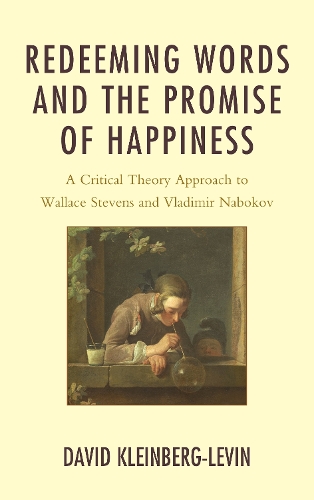
Redeeming Words and the Promise of Happiness: A Critical Theory Approach to Wallace Stevens and Vladimir Nabokov
(Hardback)
Publishing Details
Redeeming Words and the Promise of Happiness: A Critical Theory Approach to Wallace Stevens and Vladimir Nabokov
By (Author) David Kleinberg-Levin
Bloomsbury Publishing PLC
Lexington Books
31st August 2012
United States
Classifications
Professional and Scholarly
Non Fiction
Literary theory
Philosophy: aesthetics
Philosophical traditions and schools of thought
811.52
Physical Properties
Hardback
238
Width 158mm, Height 235mm, Spine 23mm
513g
Description
This book boldly crosses traditional academic boundaries, offering an original, philosophically informed argument about the nature of language, reading and interpreting the poetry of Wallace Stevens and the novels of Vladimir Nabokov. Redeeming Words and the Promise of Happiness is a work both in literary criticism and in philosophy. The approach is strongly influenced by Walter Benjamins philosophy of language and Theodor Adornos aesthetic theory, but the other philosophersnotably Plato, Kant, Hegel, Emerson, Nietzsche, Heidegger, and Wittgensteinfigure significantly in the reading and interpretation. Kleinberg-Levin argues that despite its damaged, corrupted condition, language is in its very existence the bearer of a utopian or messianic promise of happiness. Moreover, he argues, by reconciling sensuous sense and intelligible sense; showing the sheer power of words to create fictional worlds and deconstruct what they have just created; and redeeming the revelatory power of wordsthe power to turn the familiar into something astonishing, strange or perplexingthe two writers in this study sustain our hope for a world of reconciled antagonisms and contradictions, evoking in the way they freely play with the sounds and meanings of words, some intimations of a new worldbut our world here, this very world, not some heavenly worldin which the promise of happiness might be redeemed. Reflecting on the poetry of Stevens, Kleinberg-Levin argues that the poet defies the correspondence theory of truth so that words may be faithful to truth as transformative and revelatory. He also argues that in the pleasure we get from the sensuous play of words, there is an anticipation of the promise of happiness that challenges the theological doctrine of an otherworldly happiness. And in reading Nabokov, Kleinberg-Levin shows how that writer inherits Mallarms conception of literature, causing with his word plays the sudden reduction of the fictional world he has just created to its necessary conditions of materiality. The novel is revealed as a work of fiction; we see its conditions of possibility, created and destroyed before our very eyes. But the pleasure in seeing words doing this, and the pleasure in their sensuous materiality, are intimations of the promise of happiness that language bears. Using a Kantian definition of modernism, according to which a work is modernist if it reveals and questions inherited assumptions about its necessary conditions of possibility, these studies show how and why both Stevens and Nabokov are exemplars of literary modernism.
Reviews
Few if any philosophers have had the courage to engage the formal and conceptual difficulties of literary modernism, particularly its regulating idea that, as the poet Stphane Mallarm argued, language is made of words but not of the things we use words to produce: concepts, propositions, descriptions, and even expressions of feeling. Not that the literary work lacks such things, but the materiality of its language is irreducible to any of these discursive functions. On the contrary, as David Kleinberg-Levin makes clear in this remarkable book, the sensuous material of language is itself the medium of aesthetic experience as well as an experience of world-making that transforms our relation to how things are. He develops his arguments by way of careful critical readings of Wallace Stevenss poetry and poetics and by close attention to the self-reflexive features of Vladimir Nabokovs novels, in which developments of plot and character are always mediated by innovative wordplay and ironic comments on the forms and conventions of fiction-writing that Nabokov himself is employing. Kleinberg-Levins principal argument is that, contrary to a good deal of received opinion, the prominence of sensuous materiality in poetry and fiction is not a symptom of a decadent aestheticism but the fulfillment of a truly philosophical aesthetics: namely, the transfiguration of our everyday world into genuinely desirable forms of life. -- Gerald L. Bruns, University of Notre Dame
In this midst of our current troubled world, Kleinberg-Levin opens a hopeful path for us in explaining how language offers us the happiness of the transfiguration of the world that redeems, even when we have lost faith in other sources of redemption. It is even more hopeful in showing us how Wallace Stevens could find truth and transfiguration in the realm of the sensible and imaginal a redemption faithful to the earth, as Nietzsche put it, and a more modest happiness than attempts at resolving our pain or transcending it. Nabokov, in Kleinberg-Levins account, playfully explores the possibilities of language to draw upon its own sensuous divinity in the materiality and density of its workings, again providing us with a resource for originating meaning, reconciling the intellectual and sensuous, and intensifying beauty. The poetry and prose examined is rich and engaging. You will feel uplifted by this book. -- Glen A. Mazis, Professor of Humanities and Philosophy, Penn State Harrisburg
Author Bio
David Kleinberg-Levin is currently Professor Emeritus, Department of Philosophy, Northwestern University.
